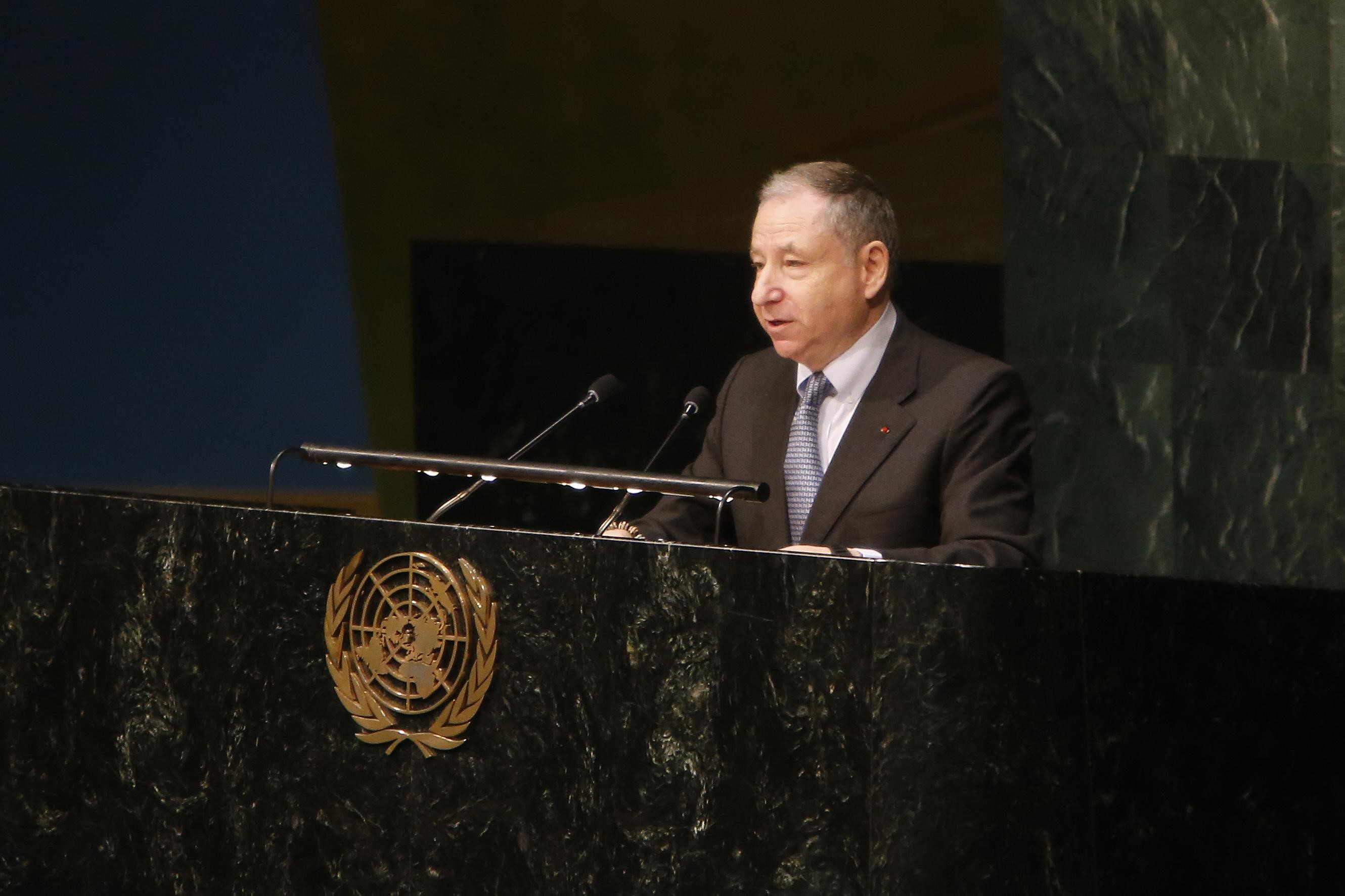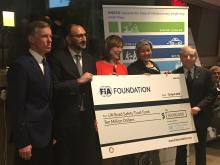
It is estimated that every year, 1.25 million people die on the world’s roads. With motorisation and urbanisation to increase in many parts of the developing world in the years to come, there is every likelihood that this number could rise. Can you explain why so many lives are needlessly lost every year on our roads and why greater action isn’t being taken to address this?
We can see the devastating impact road crashes have on families, friends and people in our community. We know the problems and we know how to fix them. But we continue to grapple with implementing the necessary actions to resolve this problem. Why? There are three main reasons.
The first is the sheer number of road safety stakeholders, many of whom have different approaches and ideas. Getting all these parties on the same page and working towards the same goal is extremely complex. We need better coordination nationally, regionally and globally. That is why the Global Plan for the
That being said, the second reason is the challenge of adapting global solutions to local situations, which requires time and care. For real results, an approach sensitive to local conditions must be developed.
Our third and probably most important hurdle is the lack of awareness and funding for road safety. Despite the 1.25 million deaths each and every year, global road safety is severely under prioritised and underfunded. Other worthy causes with similar fatality rates like AIDS, tuberculosis or malaria receive up to 1,000 times more than road safety.
Road fatalities and injuries are unnecessary and preventable. By addressing and overcoming these challenges, we can put an end to the carnage taking place on our roads. This is why as Special Envoy, I have been advocating for the establishment of a UN Road Safety Fund. And in my role as FIA president, we launched the FIA High Level Panel for Road Safety (HLP). By bringing together a coalition of leaders from the global business, international institutions and NGOs, the HLP can provide an avenue to raise awareness and funding in response to the global road safety challenge.
Can you tell us some more about the FIA High Level Panel for Road Safety? Why was the Panel established and what are some of the steps the Panel has taken to make the world’s roads safer?
The Panel was created in 2015 with the aim to promote road safety as a global public health priority. As mentioned, every year 1.25 million people die on the world’s roads. That’s 3,500 lives every day. This places a huge public health burden on our societies, yet so few people were aware of what was happening. Despite the UN Decade of Action for Road Safety being declared for the period from 2010 to 2020, progress was slower than needed and there was inadequate coordination for the road safety initiatives being carried out. A vacuum existed between our aspirations and the action being taken on the ground. By bringing together a coalition of global leaders from the business community, international institutions, and NGOs, the Panel has the primary goal of raising road safety awareness and funding globally.
Since its launch, the Panel has been working with existing organisations while encouraging others to join the fight for safer roads. The Panel’s activities are divided into three main areas: Global, Regional and National.
At the national level, we’re conducting in-country missions in Myanmar, Azerbaijan and Mexico to see where these countries are falling behind and what can be done to improve their performance.
At the regional level, we’re working with road safety observatories to ensure we have the most up-to-date and accurate data.
I’m glad that you mentioned the FIA’s #3500LIVES campaign. Many of us have seen the billboards at our local train station or on the side of the road. Can you tell us a bit more about the campaign?
The #3500Lives campaign was developed to encourage safer behaviour of all road users. The name of the campaign comes from the tragic daily loss of life on our roads. The campaign has been made possible thanks to the support of JCDecaux, who were generous enough to offer free advertising space for this cause.
We were also incredibly fortunate to have such passionate road safety ambassadors, all 14 of whom kindly offered their time for this important initiative. They are not only superstars for their incredible talents, but also for their generosity to and passion for the road safety cause.
Such strong support has meant we have been able to get this message out to over 75 countries in more than 900 cities.
We’re very happy with the results of the campaign. Not only have the billboards received wide international distribution, with an estimated 1.5 billion views, but we’ve also had a very high level of engagement online with almost 100 million views of the hashtag, 1.4 million impressions on Facebook and over half a million on Twitter. We’re currently in discussion with JCDecaux to prolong the campaign into 2018.
This year’s World Road Meeting is taking place in Delhi, India. As I’m sure you’re aware, due to its rapid economic growth and urbanisation, road safety in India has suffered. Is the FIA or the HLP conducting any activities to improve the situation?
In India there are approximately 150,000 people killed annually in road traffic crashes. While the country has less than 3% of the world’s registered vehicles, it accounts for some 11% of the world’s road deaths. In addition to this, half of all the deaths on the country's roads are among vulnerable road users - motorcyclists, pedestrians and cyclists. The figures are staggering. Even more frightening though is that if decisive action isn’t taken now, these figures will only get worse.
This situation exists largely because of planning and infrastructure problems - high-speed vehicles, many of which are in poor condition, share the road with vulnerable road users.
The FIA has recently starting working with the
It’s good to see that the government is also getting behind road safety too. Updates to the Motor Vehicle Act, a major piece of Indian legislation concerning road safety, are being debated in Parliament. If passed, these updates will strengthen road safety institutions and put in place more effective road safety regulation, promote better public transport, and embrace technological solutions.
If passed these reforms could save many thousands of lives. We need to support the government in this effort. It’s my hope that in a few years from now, the road safety situation in India will be vastly different from today thanks to these initiatives.
You’re also the United Nations Secretary General’s Special Envoy for Road Safety. Can you explain this position a little more to us?
As the UN Secretary General’s Special Envoy for Road Safety, I’ve been working with the UNECE and UN country missions to help advocate for improved global road safety. This has involved mobilising high-level political commitment towards making road safety a priority, advocating UN road safety legal instruments, sharing best practices, and advocating for increased road safety funding.
In practice, this means I’ve visited 58 countries and met with 13 Heads of State and 80 ministers to advocate for improved road safety. These meetings have resulted in four regional workshops being carried out in Africa, Latin America and Asia, and two road safety performance reviews, also in Africa. As well as a number of technical assistance requests from governments around the world.
Along with UNECE, we continue to make advances towards the establishment of a UN Road Safety Fund. After thorough consultation, our proposal has been lodged with the UN Secretary General and we expect to get word back on next steps soon. If approved, this fund would allow us to raise and channel funds to road safety initiatives that could drastically improve road safety around the world.
We are also in ongoing consultation with some of the world’s biggest car vehicle manufacturers in an effort to encourage the adoption of global minimum safety standards in all cars. It is a difficult discussion but I believe there is goodwill on all sides during these discussions and I’m confident we can find an agreement soon.
We have as our goal targets 3.6 and 11.2 of the UN’s Sustainable Development Goals, and we have so little time to achieve such significant change. I know that working together, we can halve road fatalities by 2020 and deliver safe and secure mobility to all.





